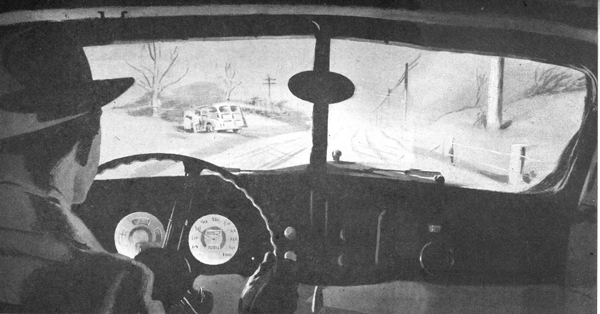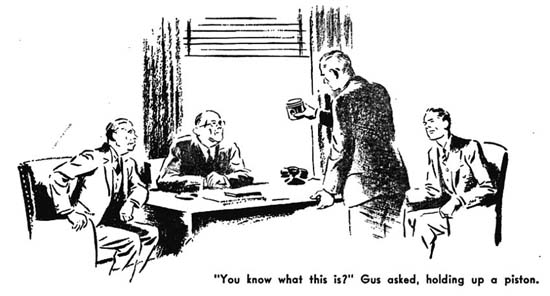March 1946
GUS SHORT-CIRCUITS AN ALIBI
by
Martin Bunn

Gus Wilson finished tightening the nuts on the clutch-to-transmission housing of George Miller's sedan and turned to Stan Hicks.
"Now Mrs. Miller won't have any more trouble with the shift lever jumping out of gear when she's in sticky traffic and her usual dither," he said. "Remember, kid, that's the way to cure that particular pain in the neck -- loosen all the nuts on the housing and then tighten them carefully and evenly, just the way you tighten the nuts on a cylinder head. Even a slight -- "
"When you've finished that lecture," broke in a disagreeable voice, "maybe you'll have time to give me some attention."
Gus looked around and without the slightest pleasure, recognized the grouchy face of Anson Fielder, local superintendent of the electric-power company.
'Oh, Mr. Fielder," Gus said, his usual cordiality lacking, "I didn't hear you come in. Want something?"
"Why do you think I'm here," Fielder replied tartly. "I want you to look at my car."
Fielder drove an expensive but somewhat battered station wagon into the shop. When he got out he screwed his face up as if he were in pain. "Sprained my ankle," he explained ungraciously. "I ought to be home in bed, and I would be if there was anyone at the plant I could trust . . . One of my pistons is shot."
Gus's educated ears had already told him that. "So I hear." he agreed. He did a quick job of checking while Fielder watched impatiently. "It's the piston of the No. 2 cylinder," he said. "I'll put a new one in."
"No you won't," Fielder told him. "You order a new piston. and I'll install it myself." "It'll save me money and I'll probably do a better job. Take the old piston out, and I'll have one of our trucks tow the car out to my place in the country. There's other work I want to do on it. How long will it take to get a piston?"
"Two or three days -- maybe more," Gus said. "You'd better leave the old one in until then. You can drive with it, anyway. The Weather Bureau predicts snow, and you, won't want to be marooned without a car."
"That's my lookout," Fielder snapped. "And besides, the Weather Bureau's wrong nine times out of ten. The truck will be here for the car at four o'clock."
That was Tuesday noon. On Thursday morning, in spite of Anson Fielder's contempt for Weather Bureau forecasts, Gus changed into his work clothes to an accompaniment of the slap of tire chains and the scrape of snow shovels on the street outside.
"I got the driveway clear," Stan said. "Some storm. It's pretty near two feet deep. What time did the lights go out?"
"About two," Gus answered, "And they didn't go back on until after seven this morning. Our friend Anson Fielder will get panned plenty for that breakdown." A horn squawked outside. "Better open the door."
Stan, did, letting in a smart-looking coupe from which stepped George E. Bevens, the president of the power company and an old friend of Gus's.
"’Morning," he greeted. Wasn't sure I'd make it in the snow. Will you get that ring job done as soon as you can, Gus? I've got a date in Florida next week -- with a sailfish. Want to come along?"
Gus saw that in spite of his offhand words Bevens' florid face was serious. "What's the matter, George?" he asked. "Worrying about that breakdown?"
Bevens looked around to make sure he and Gus were alone. "It was a bad one," he confided, "but what worries me most is that young Dale Grant failed to meet the emergency. I expect wires to go down in a sleet and snow storm, but I don't expect them to stay down for five hours."
"Dale Grant?" Gus asked. "How is Dale to blame? Fielder is the plant super -- it's up to him to keep juice flowing, isn't it?"
"Normally, yes," Bevens replied. "But he was off duty yesterday with a sprained ankle, and when they reached him by phone his car was shot and he couldn't come in until they had sent another car out into the country for him. Meanwhile, Grant was called in, and he didn't get the mess cleaned up until just before Fielder finally made it. Frankly, I'm disappointed. I had picked young Grant for the job of general superintendent -- over the head of Fielder."
Gus had known Dale Grant since he was an electricity-crazy kid in knee pants, and after the boy came home from college and went to work for the power company, he took almost fatherly pride in his quick climb to the job of assistant superintendent. He was still thinking about him when Dale himself came into the shop half an hour later.
"I want your advice about something important, Mr. Wilson," Dale said, "There were some queer things about that breakdown. One was that the wires that went down were cut -- although whoever did it made a good job of making the cuts look like breaks. Another was that the wires were cut at seven places."
He paused and stared out of the window. "But this is the real screwy part," he went on at last. "When I was on my way to the power house. I saw a man jump into a station wagon at one of the spots where a break was found and drive down a side road. I couldn't see him plainly, but my lights caught the station wagon and I'm almost sure it was Mr. Fielder's. It wasn't until an hour later that we got him on the phone, and phone service wasn't affected by the storm. He told us then that a piston was missing from his station wagon."
"That's right," Gus commented.
Dale shrugged hopelessly. "That leaves me behind the eight ball," he said. "His station wagon couldn't have been where I saw it if it was minus a piston."
"You and Fielder friends?" Gus asked.
"We got along fairly well," Dale told him, "or at least we did until he got the idea that Mr. Bevens might promote me to general superintendent. But what I want to know is whether I should tell all this to Mr. Bevens.
Gus smoked his pipe silently for at least two minutes before he answered. Then he said: "Yes, tell him."
An hour later Joe Clark came into the shop to say that Bevens was on the phone and wanted Gus to come to his office.
"Tell him I'll be over," Gus said.
Dale and Fielder were with Bevens. "There are a few questions about Fielder's station wagon that I'd be obliged to have you answer, Gus," Bevens said.
"That's up to Mr. Fielder," Gus replied.
"Go ahead," Fielder snapped, giving Dale a hard look. "I haven't anything to hide."
"Fielder tells me," Bevens went on, "that you removed one of the pistons from his engine Tuesday and ordered a new one that hasn't yet been delivered."
"That's right," Gus agreed.
"Now," Bevens continued, "I want you to do this for me. Gus, drive out to Fielder's house, examine his car, and report to me."
"Here's the garage key." Fielder said. "Lock the door when you leave.
Gus drove fast, let himself into Fielder's garage, checked over the engine, and then drove back. He reported that he had found the engine still minus its No. 2 piston.
Fielder's face showed his pleasure. "Well, Mr. Dale Grant," he smirked, "where is your cock and bull story now?"
Bevens frowned. "That proves that Fielder couldn't have driven out last night and couldn't have had anything to do with the breakdown." He looked at Dale regretfully. "Considering that there were seven different breaks in the line, I was ready to pass over the delay in restoring service, but for you to lie in an attempt to shift the blame . . . "
"Wait a minute. George." Gus cut in. "How do you know Fielder couldn't have driven his station wagon last night? Give me an hour, and I'll prove that he could."
Bevens stared at him. Then he nodded. "All right, I'll give you an hour."
Out of breath and pretty well covered with grease, Gus was back in 50 minutes. "You know what this is, don't you?"he asked Bevens, holding up a piston.
"It's an automobile piston, of course."
"The piston out of the No. 2 cylinder of your automobile, George," Gus supplemented. "You left your coupe in my shop for a ring job today. I have just removed this piston and the rod, adjusted the valves, buttoned up the engine, and driven the car over from the shop. You now have a seven cylinder car. It doesn't run very smoothly, but I could drive it across the country and back if I had to. There is every reason to believe that Fielder could do just what I've done -- he was going to install the new piston himself, so he must know engines."
Fielder's face had turned chalk white when Bevens looked around at him. "You hardly need to admit anything, Fielder," Bevens told him, "Your face does that for you. But you can save talking to the county prosecutor if you resign now."
Fielder's chin fell. He nodded consent.
"And you, Grant," Bevens went on. "get yourself a good rest from your night's work against sabotage and report tomorrow -- as general superintendent. Gus, I am much obliged. That invitation to meet a sailfish in Florida next week still stands."
END
L. Osbone 2019
